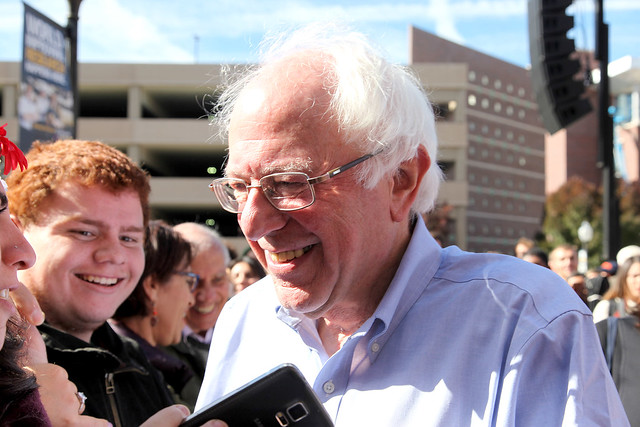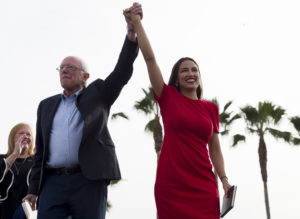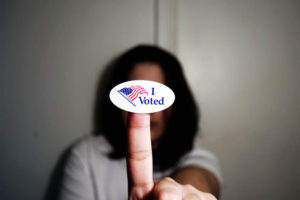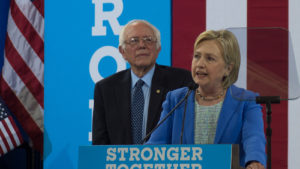Bernie’s Powerful Proposal to Enfranchise America’s Prisoners
The 2020 hopeful aims to restore inmates' voting rights, but his position is far more nuanced than corporate media might have you believe. Sen. Bernie Sanders, I-Vt. (Adrienne Campbell / Flickr)
Sen. Bernie Sanders, I-Vt. (Adrienne Campbell / Flickr)
What follows is a conversation between Truthdig contributor Norman Solomon, attorney Anoa Changa and Jacqueline Luqman of the Real News Network. Read a transcript of their conversation below or watch the video at the bottom of the post.
JAKE TAPPER [CNN] Senator Sanders earlier this evening said he’s in favor of felons being able to vote even while serving their prison terms. He was asked specifically about people like the Boston Marathon bomber, people convicted of sexual assault, rape, and other things, pedophiles. What do you think? Should people convicted of sexual assault, the Boston Marathon bomber— should they be able to vote?
PETE BUTTIGIEG While incarcerated? No, I don’t think so. [applause] I do believe that when you are out, when you have served your sentence, then part of being restored to society is that you are part of the political life of this nation again. And one of the things that needs to be restored, is your right to vote. But part of the punishment when you are convicted of a crime and you are incarcerated, is you lose certain rights. You lose your freedom. And I think during that period, it does not make sense to have an exception for the right to vote.
JACQUELINE LUQMAN Hi. I’m Jacqueline Luqman with The Real News Network. This is our weekly segment on trending topics where we discuss some of the significant news items from the past week. One of those big issues was the CNN town hall and the question of voting rights for the incarcerated. And of course, Senator Joe Biden has finally announced that he is running for the Democratic nomination for president. Here to talk about these issues with me this week are Norman Solomon. Norman is the National Coordinator for RootsAction.org. Hi, Norman. And, Anoa Changa. Anoa is an attorney and a Director of Political Advocacy for Progressive Army. She’s also the host of the highly recommended podcast The Way with Anoa. Hi, Anoa.
ANOA CHANGA Hi, Jackie.
JACQUELINE LUQMAN Thank you both for joining me today.
ANOA CHANGA Thank you for having us.
JACQUELINE LUQMAN Alright. Let’s start. Let’s jump right in with the CNN town hall this week because a lot of talk is centered around Bernie Sanders wanting the Boston bomber and rapists to vote. Like this subhead in The New York Times recap of the town hall says, it reads that Sanders backs voting rights for the Boston bomber and rapists. But what Sanders really said was this. I think we have the clip from what Sanders said at the town hall.
BERNIE SANDERS I think the right to vote is inherent to our democracy. Yes, even for terrible people because once you start chipping away and you say, “well that guy committed a terrible crime– not going to let him vote.” Or, “that person did that– not going to let that person vote.” You’re running down a slippery slope. So I believe that people commit crimes, they pay the price. When they got out of jail, I believe they certainly should have the right to vote. But I do believe that even if they are in jail, they’re paying their price to society, but that should not take away their inherent American right to participate in our democracy. [applause]
CHRIS CUOMO [CNN] Applause for the answer. My follow up question goes to this being like, you’re writing an opposition ad against you by saying you think the Boston Marathon bombers should vote not after he pays his debt to society, but while he’s in jail. You sure about that? [crowd laughs]
BERNIE SANDERS Look. You know, this is what I believe. Do you believe in democracy? Do you believe that every single American 18 years of age or older, who is an American citizen, has the right to vote? Once you start chipping away at that, believe me, that’s what our Republican governors all over this country are doing. They come up with all kinds of excuses why people of color, young people, poor people can’t vote, and I will do everything I can to resist it.
JACQUELINE LUQMAN You gotta love Sanders’s enthusiasm when he responds to this question and I want to start with you, Anoa, and ask you specifically about the role the media played in the way this question was framed. What’s your take on how CNN framed this question and how it played out for Sanders and Pete Buttigieg?
ANOA CHANGA Well I will say, if the question is like other questions for other town halls, the student who asked it more than likely wrote it. They may have helped tweak it some, but that came from that person. But I think your question about how the media has helped frame it— before this town hall, Bernie Sanders did actually come out and say he did believe that incarcerated persons should vote, which I believe is probably what prompted the question to begin with. But part of the problem with the spin has been, they stuck with the problematic framing in the actual question, as very extreme examples provided. Even you see Lindsey Graham like, oh my God. That means he thinks Dylann Roof who murdered x, y, z people in x, y, z occurrence should get to vote— trying to inflame rhetoric and we know that this is an industry that’s heavily driven by clicks, by headlines. Most, 60 percent of Americans do not read past the headline in most instances, so it is driving a particular narrative. But when you really dig deep and you start looking at it, and you see most of the major civil rights organizations, legal organizations, pushing back and also saying, “duh. This is a no brainer. Bernie Sanders is right because voter suppression of any form should not be tolerated.” We should not be writing caveats into really what is one of the most fundamental rights that we should be protecting. And as in many states, we see that the right to vote has actually been severely eroded in many occurrences. Now when we’re talking about incarcerated persons, incarcerated persons are good enough to go fight fires for pennies on the dollar. They’re good enough to be counted for when you draw congressional districts. They are counted as part of that population, but they’re denied the opportunity to vote and participate. One thing that I always thought was really great from last cycle was, Rachel Rollins, who’s now D.A. of Suffolk County which is around Boston— in their D.A. primary race, there was actually a forum that was held with incarcerated persons in the county asking questions of the D.A. candidates and what they would do on criminal justice reforms, etc. I think being able to have those people participating in the process and not being shut out because we see just what the re-enfranchisement of voters in Florida, how Republicans— but it’s not only just Republicans in Florida. Instances predominately Republican-led to just create an extra hurdle to the amendment that overwhelmingly passed with support of Floridians and we see now they’re trying to put these other barriers in, but what basically amounts to a poll tax. So there are all these very nuanced aspects to this very basic idea that Bernie Sanders is discussing, which the lack of nuance sometimes with him is one of my major critiques of the way he communicates ideas and issues. And I just felt that instead of accepting her problematic, extreme framing which is what everyone ran with in headlines, it could have been flipped on his head. But I thought overall, he’s absolutely right-on about this whole premise that when we start eroding, deciding, and picking and choosing who is valuable, who can vote, and who cannot— we start to create a slippery slope. We already see that happening in many states across the country.
JACQUELINE LUQMAN You raised a lot of great issues, but I think the one that stuck out to me the most was that the statistic that 60 percent of Americans don’t read past the headline. So what we get from the media is driven by clicks, is driven by sensationalism, and there is this nuance that is very, very important in this discussion that Sanders seems to have done a good job with. He also seems to have had a better reception at the Fox News town hall with explaining Medicare for All than he did here. And even some on the Left have come out against him on this issue from this town hall. But there’s also been pushback against CNN for this framing, like this tweet from Alexandria Ocasio Cortez and her response. But Norman, I want to ask you, when we’re talking about the framing of this discussion and the fact that incarcerated people were not included in this discussion in the town hall, that this was an audience of students from a local college, I believe— is this really an issue of, as The New York Times framed it, “giving terrorists and rapists the right to vote,” or is this a bigger problem with corporate influence in the media that we need to pay attention to?
NORMAN SOLOMON A lot of the problem with corporate media is continuing to depict some people as the other, prisoners among them but more generally and more subtly often, just people of color or those who don’t have a lot of power in this society. And if we’re going to look at this particular instance, it’s not just CNN and cable news. As you noted, The New York Times took the most retrograde, opportunistic, and slanderous way to frame Bernie Sanders’s response. And what I think we need to look at very strongly and very clearly, is that this issue is the Willie Horton issue so far of this presidential campaign. As in 1988, the racist ad against Michael Dukakis by the George Herbert Walker Bush forces, were also playing on racism and the fear of prisoners and trying to exploit some of the most racist tropes that have been in place for centuries in this country. And frankly, I’m outraged that The New York Times and other media outlets would take a principled position by Bernie Sanders against perverse oppression and turn it around and try to exploit the most extreme interpretations of what he said, to make this Willie Horton-2019. And so, I just think we have to push back on this and recognize that this is part of a propaganda assault.
JACQUELINE LUQMAN This is some really great comparisons. These are some great comparisons you made Norman about the similarities to the Willie Horton campaign and the Dukakis campaign. This is journalistic history, or campaign and political history, that we need to be reminded of when we’re looking at the role of corporate media in our politics today. Anoa, let me give you the last word on this. What role does independent media play in this campaign cycle? Is it a bigger role than last time? What role does independent media play in these types of issues?
ANOA CHANGA Well I appreciate that. This is how we first crossed paths, right? I think that in this cycle, just as we saw the past cycle, there is a really high burden whether it’s right or wrong. It’s the value proposition that we often say that we have as progressive, independent media folks, that we’re trying to parse through the b.s. and really get good commentary, get straight to the issues, and inform people of what’s going on. So I do think that we do have this standard to really, actually, effectively discuss these issues to help raise the voices of people who are doing directly the work and get people actual information. I don’t remember who shared it, but someone shared a report from The Sentencing Project. The Sentencing Project has been talking about incarcerated persons voting while incarcerated for probably almost two decades. I think I saw something that was actually dated 1999, so this is not a new thing that Bernie Sanders just thought of. This is something that’s been well-thought and often discussed by a lot of people. When you look at the containing conditions of those who are incarcerated here— and we focus so much on the federal prison system or private prisons— but the majority of people who are in prison in this country, are in state and local holding. And the conditions that people are in— just recent accounts from Fulton County and DeKalb County jails down here in Georgia are appalling. We’re seeing issues of strikes, of starvation, people having issues with being exposed to mold, all types of stuff. I remember, real quickly, during the 2014 West Virginia water crisis in Charleston, West Virginia, incarcerated persons were being given the equivalent of I think it was one bottle of water per day. And this was a time where as a community, as a county-wide area, we were on a 10-day water ban, so no water for anything. They were being given one bottle. So when we’re saying that we’re not allowing people to participate civically in what is happening, we’re saying that they don’t— we, as in the people who are saying— saying that these people are not people. They’re second class citizens. They don’t count as much as we do and that’s a problem. And again, like Bernie Sanders just said, when we start creating special classes of people as we’ve already seen, he was talking about going back to a different era, that’s exactly the type of rhetoric we’re hearing from people is actually enforcing and supporting. And we already have a steep climb to getting people re-enfranchised who’ve already been disenfranchised from the system. So these barriers that are there, are kept up, are problematic. I think independent media has a real, serious burden on us. And really, it should be our welcomed burden to make sure that were upholding good conversations as truthful commentary as possible, and really digging deep and doing critical analysis, even if it means calling our faves on the carpet.
JACQUELINE LUQMAN And you know, we’ve certainly done plenty of that. [laughter] Thank you guys so much for joining me today on this segment. Unfortunately, we are out of time on this segment. But Norman, Anoa— stick around for the next segment where we will talk about Joe Biden’s announcement. Thank you all for watching this segment of trending news on The Real News Network. I am Jacqueline Luqman.
Your support matters…
Independent journalism is under threat and overshadowed by heavily funded mainstream media.
You can help level the playing field. Become a member.
Your tax-deductible contribution keeps us digging beneath the headlines to give you thought-provoking, investigative reporting and analysis that unearths what's really happening- without compromise.
Give today to support our courageous, independent journalists.









You need to be a supporter to comment.
There are currently no responses to this article.
Be the first to respond.